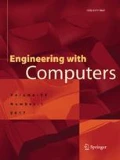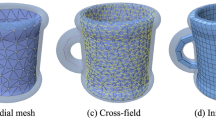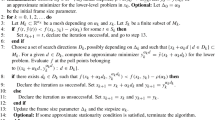Abstract
The triangulation refinement problem, as formulated in the adaptive finite element setting (also useful in the rendering of complex scenes), is discussed. This can be formulated as follows: given a valid, non-degenerate triangulation of a polygonal region, construct a locally refined triangulation, with triangles of prescribed size in a refinement regionR, and such that the smallest (or the largest) angle is bounded. To cope with this problem, longest-side refinement algorithms guarantee the construction of good quality irregular triangulations. This is due in part to their natural refinement propagation strategy farther than the (refinement) area of interestR. In this paper we prove that, asymptotically, the numberN of points inserted inR to obtain triangles of prescribed size, is optimal. Furthermore, in spite of the unavoidable propagation outside the refinement regionR, the time cost of the algorithm is linear inN, independent of the size of the triangulation. Specifically, the number of points inserted outsideR is of orderO(n log 2 n) whereN=O(n2). We prove the latter result for circular and rectangular refinement regions, which allows us to conclude that this is true for general convex refinement regions. We also include empirical evidence, both in two and three dimensions, which is in complete agreement with the theory, even for small values ofN.
Similar content being viewed by others
References
Bern, M.; Dobkin, D.; Eppstein, D. (1992) Triangulating polygons without large angles. Proceedings 8th ACM Symposium on Computational Geometry, 222–231
Preparata, F.P.; Shamos, M.I. (1985) Computational Geometry: an Introduction. Springer, New York, Berlin, Heidelberg
Rivara, M.C. (1984) Design and data structure of fully adaptive multigrid, finite-element software. ACM Trans on Mathematical Software, 10, 242–264
Rivara, M.C. (1984) Algorithms for refining triangular grids suitable for adaptive and multigrid techniques. International Journal for Numerical Methods in Engineering, 20, 745–756
Rivara, M.C. (1987) A grid generator based on 4-triangles conforming mesh-refinement algorithms for triangulations. International Journal for Numerical Methods in Engineering, 24, 1343–1354
Rivara, M.C. (1989) Selective refinement/derefinement algorithms for sequences of nested triangulations. International Journal for Numerical Methods in Engineering, 2889–2906
Rivara, M.C.; Levin, C. (1992) A 3D refinement algorithm suitable for adaptive and multigrid techniques. Communications in Applied Numerical Methods, 8, 281–290
Rivara, M.C.; Iribarren, G. (1994) The 4-triangles longest-side partition of triangles and linear refinement algorithms. To appear in Mathemtics of Computation
Vlassopoulos, V. (1990) Adaptive polygonization of parametric surfaces. The Visual Computer, 6, 291–298
Bova, S.W.; Carey, G.F. (1992) Mesh generation/refinement using fractal concepts and iterated function systems. International Journal for Numerical Methods in Engineering, 33, 287–305
Author information
Authors and Affiliations
Corresponding author
Rights and permissions
About this article
Cite this article
Rivara, M.C., Vemere, M. Cost analysis of the longest-side (triangle bisection) refinement algorithm for triangulations. Engineering with Computers 12, 224–234 (1996). https://doi.org/10.1007/BF01198736
Issue Date:
DOI: https://doi.org/10.1007/BF01198736




